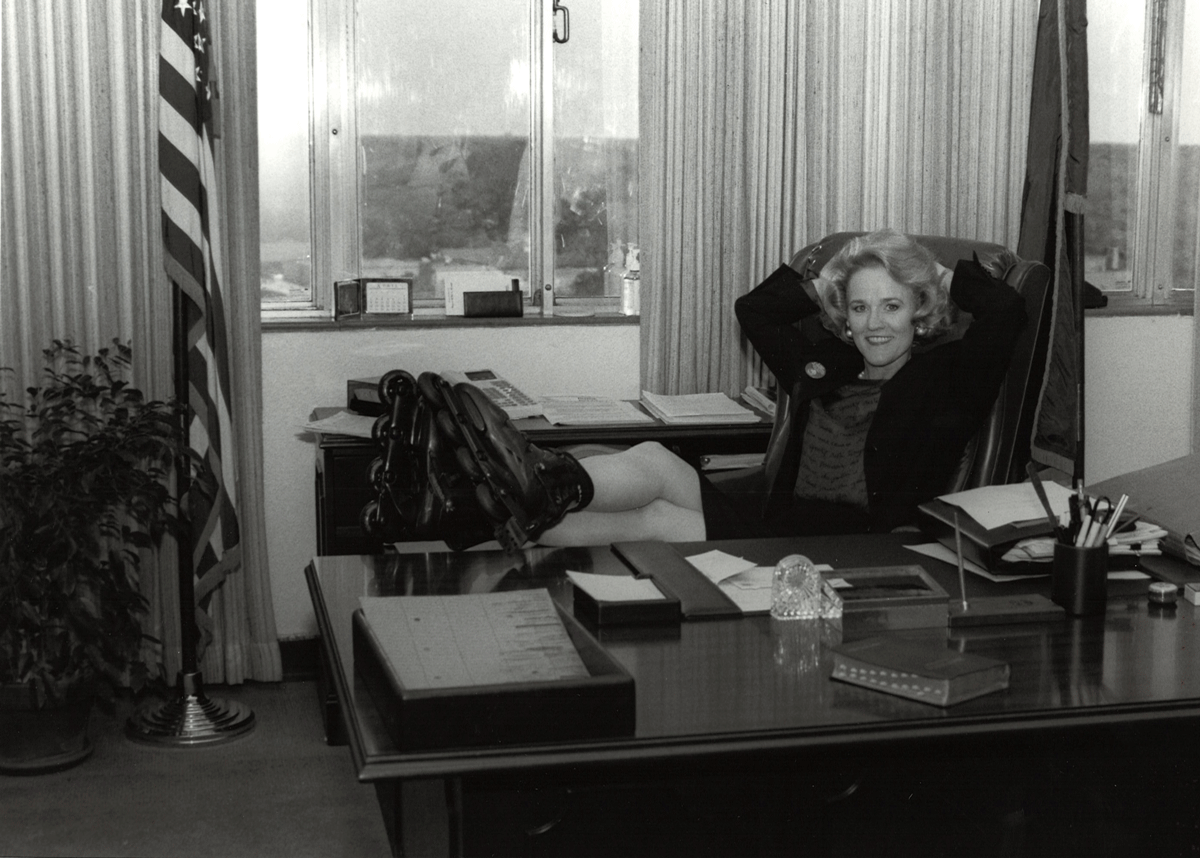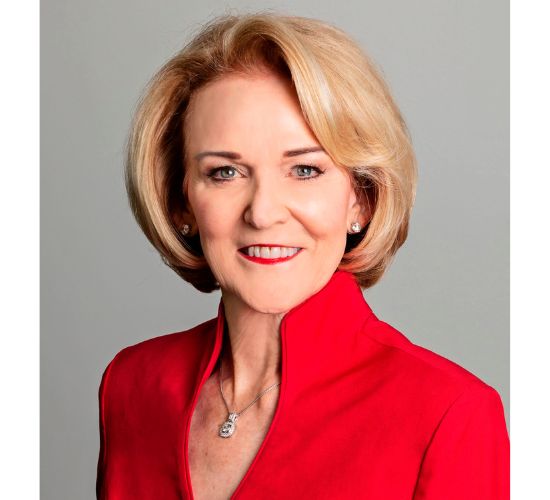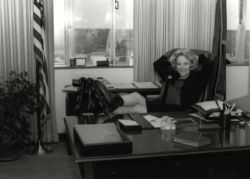Summer 2025
The Cool Head in the Room
Willie Landry Mount Receives the 2025 Chair’s Award for Institutional Support
Published: May 30, 2025
Last Updated: August 29, 2025

Courtesy of Willie Landry Mount
Willie Landry Mount posed in roller skates at her desk during her tenure as mayor of Lake Charles.
Miranda Restovic: Willie, congratulations on receiving the Chairs Award for Institutional Support. Well-deserved! This award is a special one for the LEH, because it’s an award that’s given by the board to individuals who have made a significant impact on the LEH’s mission and programs.
I first wanted to start off by just saying that I felt so privileged to have had the opportunity to work with you for over a decade and to get to know you. You’ve heard me describe you as a mentor and as someone who I’ve observed to be the ultimate diplomat, the ultimate parliamentarian, the cool head in the room, the person that can move things along. I’ve benefited greatly from that, and I think the LEH has also.
I wanted to start from the beginning and ask you, in your own words, how would you describe the circumstances of how we met and began our decade-long journey of working together at the LEH?
Willie Mount: Phil Earhart, member of the LEH and also from Lake Charles. . . We were friends, and community volunteers, and so on. He makes a call one day and says, “I’d really, really like you to consider membership in the LEH, and submit your name to be nominated to the board.” We had a good visit, and I have great respect for Phil. So I submitted my information to the LEH, and fortunately, I was accepted. I’ve been a member and a board member for a long time. I just rotated off in November [2024], and it’s like I’m missing one of my arms, because I was so involved with the LEH, and I love the LEH, and will always be committed to the LEH.

Courtesy of Willie Landry Mount
MR: Well you know I’m not going to let you go too far. You mentioned you’re from Lake Charles. You went on to become mayor, then Louisiana State Senator. So what made you realize you wanted to stay in Louisiana? Because I’m sure you had lots of opportunities to do other things beyond our borders and to pursue a career in politics.
WM: I can’t imagine living anywhere else. Simply put, I was born and raised in Lake Charles. Of course, I ventured out into other states and enjoyed that, but I ended up coming home and marrying a local person from Southwest Louisiana, and that’s my roots. I have a very close relationship with my siblings, there are three others besides me, and we had a strong family unit. We had strong parents that raised us to give back, to be community servants, and so I certainly credit my parents for that ability to understand how significant it is to help others and to participate in other organizations that will impact the community at large. So in my view, the LEH is very impactful to every parish, all sixty-four parishes, and you see it in so many different ways. There’s Prime Time, there’s educational components, there’s the culture of Louisiana, and, you know, on and on.
MR: I know you’ve chatted with me a little bit about this, but how did it feel to achieve the milestone of becoming Lake Charles’s first female mayor? And what do you hope others take from your legacy?
WM: Well, the opportunity [for other women] to run again. This was ‘93, okay, so it was very unusual for a female to run in our part of the state for an elected position. And that was my first jump into the game, as I call it, because I ran against four men: a mayor, a past mayor, and two city council members. If I went business-to-business or knocked on doors, people literally would just laugh and say, “You gotta be kidding me. There’s no way you can be the mayor.” And the more I heard that, the more determined I became. I said, “We’ll see about that.” And so I made the runoff. I led the runoff by 2000 votes, and then I ended up running against a previous mayor, and you know the rest of that story. But the significance of a female being elected to a citywide position was unique at the time for our part of the state, probably all the state, and it was more important for me to be the right example for other people—particularly women and young girls, but for everyone: that we are as capable as the next person who runs for office.
And so that first six months to a year, I really homed in on that particular issue. By the end of a year or so, people said, “Hey, she’s getting things done. This is okay.” When I ran for reelection, I was unopposed, and that was significant for me, at that point in time in my career. I served as the mayor for almost seven years, from ‘93 to 2000. At the end of ‘99 I ran for the state senate, because the position had become open, and I wouldn’t be running against an incumbent, which was important to me. Luckily, I was selected, and served twelve years unopposed, both times. And then, I lost my husband in December of 2011 and in 2012 I was term limited. So I said, “I can stay home and feel sorry for myself, or I can get out there.” So I began to serve or say yes to folks who would call about different nonprofits. I’m kind of a full-time volunteer now.
I think the LEH is the organization that really touches every part of the state in so many different ways, and I think that’s significant.
MR: You served as board chair during a pivotal time at the LEH and prior to that, you served as our treasurer. One of the things I wanted to dig a little deeper on is, why have you felt it’s important for you to prioritize supporting the LEH and local humanities initiatives? Is it because of that responsiveness or is there something else that’s also driving your commitment to our work.
WM: Well, as I said earlier, you know, I can’t imagine living anywhere, but in Louisiana, I love Louisiana. I love the culture. I love the diversity, and we often say we’re just like a delicious gumbo, you know, it’s all these different cultures [that] all come together in this beautiful place called Louisiana, but I think the LEH plays a very vital role in Louisiana. We impact all different points of view—all different areas of the state—and there are not many organizations that have that widespread touch that we have. I think it’s because of people like yourself. We have a very diverse board, and the membership of the board certainly represents our state very well.
When I first sat as a new board member, that was not the case. I mean, the question was asked, “How long does it take you to get to New Orleans?” And my answer was, “The same amount of time it takes you to go to Lake Charles,” like we were this foreign country. That’s not the case anymore.
I do think that all the programming we provide is very pointedly affecting education, health, coastal restoration, art, and children. I mean, it’s like a palette of anything that you have in Louisiana, we touch one way or the other, and that’s very significant, and why I have been a member and will continue to be a member, and would encourage any folks to do the same, to contribute to an organization that brings such joy and effectuates change in our state. Does that answer it sort of?
MR: Yes. Of course, that’s beautiful. Willie, what do you think the future has in store for the LEH or what would you envision for our future?
WM: Well, I believe we should build on our strengths and be very aware of things that we have not touched yet. I don’t know what that would be, but I’m sure there are other areas that we could have a dominant role in or assist in. I would like for us to continue to focus on that strategic plan, continue to monitor or measure what our outcomes are. How can we do better? What can we improve on? Because, whether it’s your personal life or your community life, we can always do more, we can always do better, and we need to agree that we’re not always going to be on the same page, but that we are willing to collaborate. We’re willing to compromise. I think that’s very important, not only in the LEH but in our state government, and certainly in our federal government.
MR: So Willie, what does receiving the LEH’s Chair Award for Institutional Support mean to you?
WM: Well, I’m very humbled and honored to receive this award. You know, I think there are many others more well deserved, I have to say. But I do appreciate the recognition, because I just love the LEH and look forward to continuing to be involved in ways that I can be as a non-board member, and will continue to contribute, of course, to the welfare of this great organization.
MR: What would your advice be for those who want to be more involved in the humanities or Louisiana culture and helping them reach all Louisianans?
WM: Well, I think between all of our mechanisms for reaching out 64 Parishes [stands out]. And as you well know, our elected officials have all received this magazine. It’s far reaching in that you don’t realize, I guess, or I didn’t, “Hey, this is just chock-a-block full of good information about the one state that we all live in and that we love.” So I think that’s very significant way to impact the individual, and hopefully that will stimulate that individual and say, “I need to be a member of the LEH,” or “I want to volunteer on coastal restoration,” or whatever the issue might be.
Then we as an organization continue to reach out in a variety of ways, social media, etc., and that plays a role, too. When I first started, I didn’t see us really aggressively going out to communities and individuals to solicit their support or engagement, and we do that now, and so we just need to continue to reach out and have more people become involved, [have] more people engaged.
MR: Well, Willie, that was my last question. Thank you so much. Is there anything else you want to share with us that we didn’t cover?
WM: I just encourage people to support the LEH in any way they can. I encourage people to volunteer—whether it’s in their church, their community, their parish, or even the state. We desperately need more people to be engaged and involved in all of Louisiana, everything that’s going on in Louisiana. And I think the LEH is the organization that really touches every part of the state in so many different ways, and I think that’s significant. I belong to many organizations, but the LEH, their tentacles are everywhere, and it just is so important for people to understand how impactful the LEH is on the life of Louisiana.
